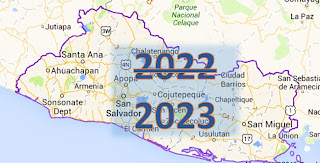As El Salvador enters 2023
After taking a break from writing at El Salvador Perspectives for most of December, I am making plans for more frequent and varied content on this site for 2023. In January, we'll start with a series of posts looking at the current situation in El Salvador in a variety of areas, from the economy and tourism, to the environment and development projects, to human rights and Bitcoin.
This new series follows an "exceptional" year in 2022. Called exceptional because the country lived under (and continues to live under) a State of Exception since the end of March 2022, which the government proclaims as an all out war on gangs. At the end of 2022, homicides were at all time lows in the country, the country was firmly under control of a single person, president Nayib Bukele, and the number of persons held in Salvadoran prisons was at an all time high, giving El Salvador the distinction of imprisoning a greater percentage of its population than any other nation. Local and international human rights groups denounced the excesses of the State of Exception, but neither the government led by Bukele nor the public seemed to care.
2022 was not the year of Bitcoin that Bukele had been proclaiming twelve months ago. Despite Bitcoin's status as legal tender in the country, use of the crypto-currency in El Salvador by the vast majority of residents is minimal. The country's investments in Bitcoin have lost more than 60% of their value against the US dollar, El Salvador's other currency. The billion dollar Bitcoin "volcano bond" offering announced by Bukele in November 2021 never took place.
In 2022, El Salvador's relations with the US continued to deteriorate as the US sanctioned more members of El Salvador's government, the economy returned to pre-pandemic growth levels (not very strong), and inflation hit El Salvador like the rest of the world. More tourists were arriving in the country, whether drawn by the surf, by Bitcoin buzz, improved security, or just successful marketing.
In 2022, Nayib Bukele announced he would run for re-election in 2024, a move which most independent legal experts assert violates the country's constitution. 2023 will be dominated by the political campaign of Bukele and his Nuevas Ideas party because every elected office in the country will be on the ballot in the opening months of 2024. Their electoral campaign will also take place in the US and globally since the Salvadoran diaspora will be able to vote by internet for the first time in 2024. At this point, no political movement has arisen which represents a credible challenge to the domination by Bukele of the country's politics.
At the end of the year, president Nayib Bukele's approval rating among the Salvadoran public was 88%.
I'll write more about all these subjects in coming days and weeks.

Comments